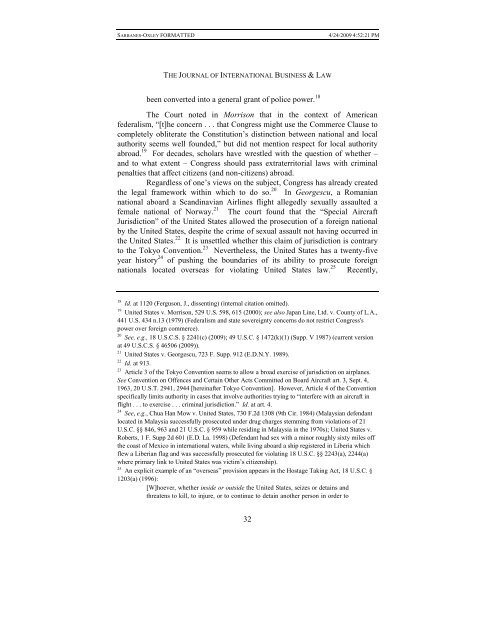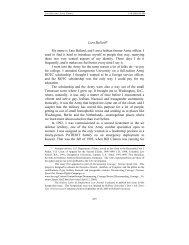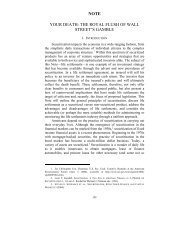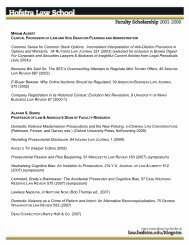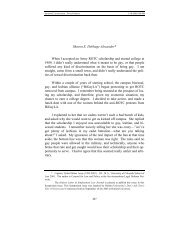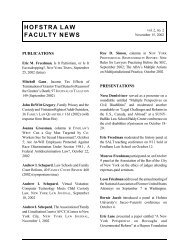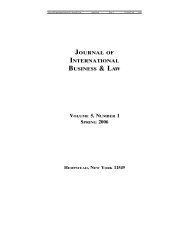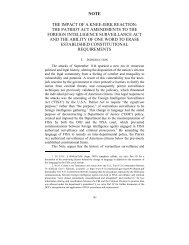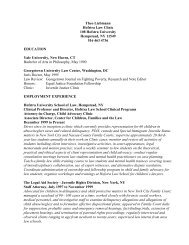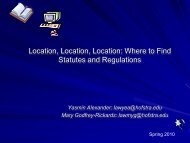JOURNAL OF INTERNATIONAL BUSINESS & LAW - Hofstra Law ...
JOURNAL OF INTERNATIONAL BUSINESS & LAW - Hofstra Law ...
JOURNAL OF INTERNATIONAL BUSINESS & LAW - Hofstra Law ...
You also want an ePaper? Increase the reach of your titles
YUMPU automatically turns print PDFs into web optimized ePapers that Google loves.
SARBANES-OXLEY FORMATTED4/24/2009 4:52:21 PMTHE <strong>JOURNAL</strong> <strong>OF</strong> <strong>INTERNATIONAL</strong> <strong>BUSINESS</strong> & <strong>LAW</strong>been converted into a general grant of police power. 18The Court noted in Morrison that in the context of Americanfederalism, “[t]he concern . . . that Congress might use the Commerce Clause tocompletely obliterate the Constitution’s distinction between national and localauthority seems well founded,” but did not mention respect for local authorityabroad. 19 For decades, scholars have wrestled with the question of whether –and to what extent – Congress should pass extraterritorial laws with criminalpenalties that affect citizens (and non-citizens) abroad.Regardless of one’s views on the subject, Congress has already createdthe legal framework within which to do so. 20 In Georgescu, a Romaniannational aboard a Scandinavian Airlines flight allegedly sexually assaulted afemale national of Norway. 21 The court found that the “Special AircraftJurisdiction” of the United States allowed the prosecution of a foreign nationalby the United States, despite the crime of sexual assault not having occurred inthe United States. 22 It is unsettled whether this claim of jurisdiction is contraryto the Tokyo Convention. 23 Nevertheless, the United States has a twenty-fiveyear history 24 of pushing the boundaries of its ability to prosecute foreignnationals located overseas for violating United States law. 25 Recently,18 Id. at 1120 (Ferguson, J., dissenting) (internal citation omitted).19 United States v. Morrison, 529 U.S. 598, 615 (2000); see also Japan Line, Ltd. v. County of L.A.,441 U.S. 434 n.13 (1979) (Federalism and state sovereignty concerns do not restrict Congress'spower over foreign commerce).20 See, e.g., 18 U.S.C.S. § 2241(c) (2009); 49 U.S.C. § 1472(k)(1) (Supp. V 1987) (current versionat 49 U.S.C.S. § 46506 (2009)).21 United States v. Georgescu, 723 F. Supp. 912 (E.D.N.Y. 1989).22 Id. at 913.23 Article 3 of the Tokyo Convention seems to allow a broad exercise of jurisdiction on airplanes.See Convention on Offences and Certain Other Acts Committed on Board Aircraft art. 3, Sept. 4,1963, 20 U.S.T. 2941, 2944 [hereinafter Tokyo Convention]. However, Article 4 of the Conventionspecifically limits authority in cases that involve authorities trying to “interfere with an aircraft inflight . . . to exercise . . . criminal jurisdiction.” Id. at art. 4.24 See, e.g., Chua Han Mow v. United States, 730 F.2d 1308 (9th Cir. 1984) (Malaysian defendantlocated in Malaysia successfully prosecuted under drug charges stemming from violations of 21U.S.C. §§ 846, 963 and 21 U.S.C. § 959 while residing in Malaysia in the 1970s); United States v.Roberts, 1 F. Supp 2d 601 (E.D. La. 1998) (Defendant had sex with a minor roughly sixty miles offthe coast of Mexico in international waters, while living aboard a ship registered in Liberia whichflew a Liberian flag and was successfully prosecuted for violating 18 U.S.C. §§ 2243(a), 2244(a)where primary link to United States was victim’s citizenship).25 An explicit example of an “overseas” provision appears in the Hostage Taking Act, 18 U.S.C. §1203(a) (1996):[W]hoever, whether inside or outside the United States, seizes or detains andthreatens to kill, to injure, or to continue to detain another person in order to32


